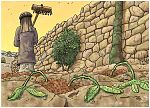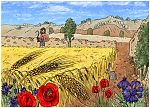Bible Cartoon: Matthew 13 - Parable of the sower - Scene 04 - Choking thorns
Click on Add to cart button below shopping cart.
Purchased Bible Cartoons do not have watermarks. Links to Cartoons provided on email once purchase is completed.Bible Book: Matthew
Bible Book Code: 4001300701
Scene no: 4 of 10
Bible Reference & Cartoon Description
Matthew 13:7 (NLT)
7 [Jesus continue telling his parable] “Other seeds fell among thorns that grew up and choked out the tender plants.”
DRAWING NOTES:
TIME OF DAY:
Middle of the afternoon.
LIGHTING NOTES:
The sun (unseen & off to the right) illuminates this scene, casting shadows to the left of objects.
CHARACTERS PRESENT:
None.
RESEARCH/ADDITIONAL NOTES:
Unlike the two previous scenes, the viewer is looking towards the corner of the farmer’s field, with the rest of field behind the viewer. Here we can see some thistles overshadowing a little seeding, what’s more, some nasty bindweed is climbing up it and choking the life out of it. Already the seedlings little leaves and stem have shrivelled up in the tenacious grip of the bindweed!
The small thistle with yellow flower in the foreground is Scolymus maculatus (aka Spotted Golden Thistle). This very prickly thistle has pale leaf & stem margins. This plant grows to up to 1.5 metres (nearly 5 feet) high.
The pale pink flowers below to Carduus argentatus (aka Silver Thistle), which has silver margins to its leaves. The plant grows to a height of about 30 centimetres (12 in) and has erect stems with spiny wings.
The spiky, cactus-like pink thistle on the right is Centaurea iberica (aka Spanish Centaury-thistle, Iberian knapweed, or Iberian star-thistle). This thistle grows between 20 centimetres – 2 metres (7.7 inches – 6.5 feet) tall.
There are about 200-250 species in the Convolvulus (Bindweed) family, I have drawn Convolvulus arvensis L. (aka Field Bindweed, Bearbine, Bethbine, Cornbine, Field Convolvulus, or Wild Convolvulus). The leaves are spirally arranged, linear to arrowhead-shaped, 2–5 centimetres (0.7-1.9 inches) long. Although it produces attractive flowers, bindweed is often unwelcome in crop fields/gardens because it is a nuisance weed which grows rapidly and chokes cultivated plants.





